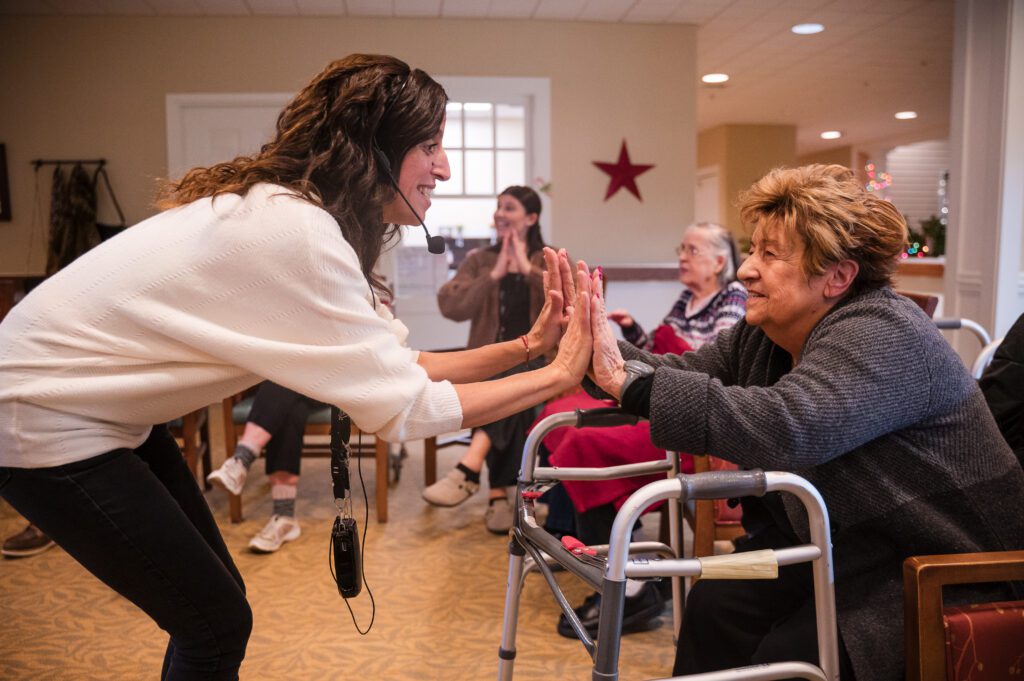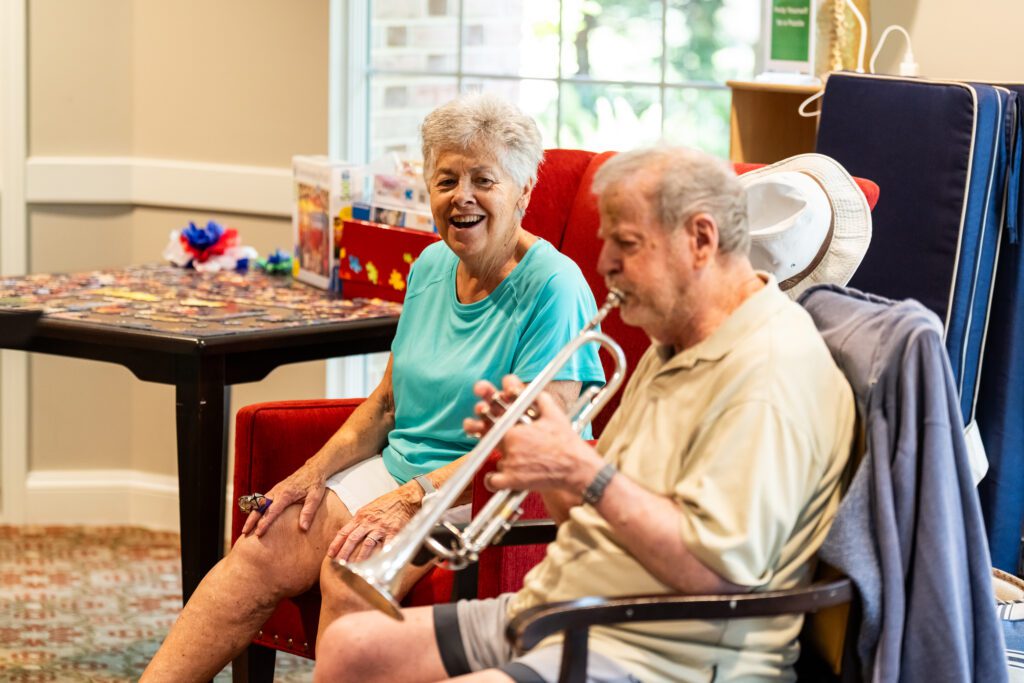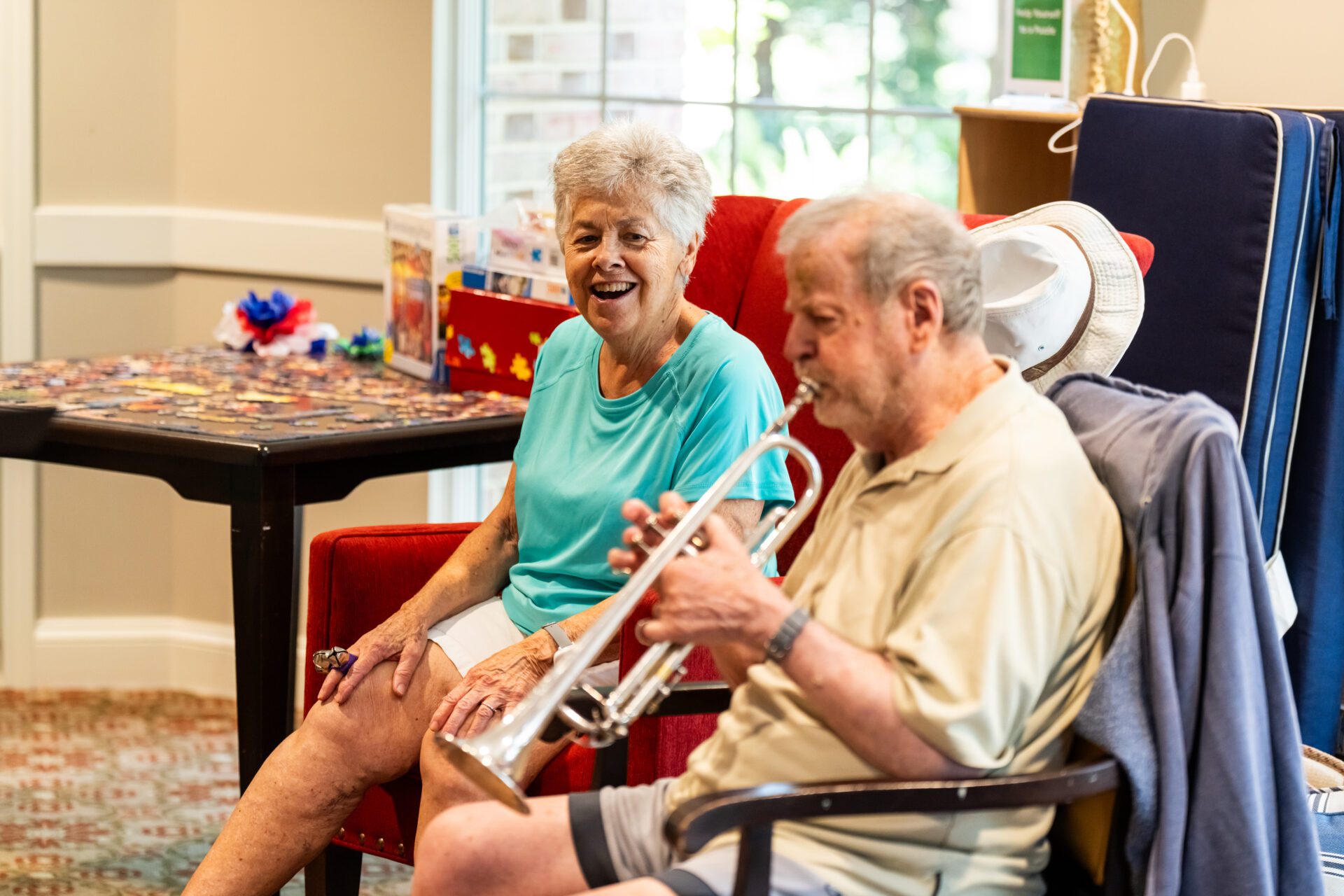It’s natural to want your parent, in-law, or another loved one with dementia to live at home. You and other family members may care for them with in-home helpers or an adult daycare. But for many, these are short-term measures while deciding if it’s the right time for memory care.
To help you decide when memory care is needed, we spoke with Living Branches team members who work with residents living with dementia.

How to Decide When Memory Care Is Needed
Dementia and Alzheimer’s disease progress over time. Many spouses and families reach a point where they are no longer able to care for the person who needs memory care.
So when is the right time for memory care? The answer varies from person to person. Living Branches caregivers pinpoint three reasons families often delay memory care:
- Not knowing what memory care is for
- Not realizing the impairment is advanced
- Guilt about seeking long-term memory support
The key to knowing the right time for memory care is to start the conversation early.
“Families often miss the signs it’s time for memory care until there’s an incident,” says Annette Echanis, director of resident engagement for Living Branches. “Sometimes it’s a fall. Sometimes mom keeps leaving the stove on. Or a caregiver falls asleep for a moment and the person living with dementia leaves the home. We often see families later than the ideal time.”
Who Is Memory Care For?
Many families do not know when memory care is needed and who memory care is for. They may believe it’s only for the most advanced stage of memory loss.
The truth is memory care is for anyone who would benefit from the structure, safety, and joy of a community of peers. Memory care meets a person’s physical, mental, emotional, and social needs. Solo caregivers often cannot do all this at home.
There’s no one “right” kind of person for memory care. Most memory care communities are home to folks with a range of cognitive and memory challenges. Some have been there for a long time; others are adjusting to the community. Some have no trouble speaking, while others speak very little. Some have chronic illness along with dementia, while some are physically healthy.
“It comes down to offering the best quality of life for a person living with dementia,” Annette says.
How Advanced Is Dementia When Memory Care Is Needed?
After years together, caring for a family member comes naturally. That can make it hard to notice when you’re providing more care than you used to.
“You can provide an increasing amount of care without realizing it,” explains Ellen Runk, a social worker at the Dock Woods community of Living Branches. “Maybe you always cooked for your husband, but now you have to encourage him to eat. Or you’re reminding your mom to do simple things she used to do on her own, like brushing her teeth.”
A loved one’s expectations can also prevent them from knowing when memory care is needed.
“Family members often have preconceived notions of what mom or dad can do,” Annette says. “It can be hard to adjust your expectations and accept that their capabilities have changed.”
It’s easy to miss how serious a person’s cognitive challenges are, even with extra help.
“Bringing in extra caregivers or using an adult daycare can help bridge the gap. But it will not provide the all-around care needed in the long-term,” Ellen adds. “It can really sneak up on you.”
When You Realize It’s the Right Time for Memory Care
When it’s time for memory care, feelings of guilt or failure can arise. Loved ones often feel they must directly provide all the care needed.
“As a primary caregiver, you’re just one person with two hands,” Ellen says. “Accepting support from others is best for your loved one and for your own wellbeing.”
Annette adds that guilt is natural if you don’t realize how beneficial a memory care community can be. Families may feel they are moving their loved one into an environment that’s not ideal. In reality, memory care usually offers more opportunities than home life.
“One person can’t provide all the activities, socialization, and around-the-clock care that is needed,” she explains. “And consider who is providing that care. The teams in our Memory Care communities at Living Branches are trained well, experienced, and refreshed every eight hours. It takes training, patience, and attention to engage a person with memory loss and adjust activities to them.”

8 Behaviors That May Mean It’s the Right Time for Memory Care
It may be time to consider memory care if your loved one’s care needs disrupt your daily life and sleep. You may notice he or she:
- Gets lost when walking or driving near their home
- Leaves appliances on when not in use, such as the stove or kettle
- Neglects their medication or takes too much
- Needs cues about what to do next during normal routines
- Forgets to pay bills, or pays them more than once
- Struggles to follow written instructions or reminders
- Wears too many layers, or clothing that doesn’t match the weather
- Needs supervision to prevent leaving the house unattended
Before the transition to memory care, a nurse, social worker, or another care provider will assess your loved one. They will look for these behaviors and assess how your loved one answers written and verbal questions. The goal is to decide whether it’s the right time for memory care.
Burnout: A Major Sign Memory Care Is Needed
Both Annette and Ellen point to caregiver burnout as a sign that memory care is needed. Burnout can take many forms:
- Difficulty falling or staying asleep
- Feeling tired all the time, regardless of how much you sleep
- Unexplained headaches or body aches
- Changes in weight
- Feeling overwhelmed, detached, or disinterested in life
- Avoiding social time with friends or family
- Neglecting hygiene, grooming, or physical health
- Feeling irritable, frustrated, or impatient with your loved one
- Trouble focusing on tasks or making decisions
“A caregiver who neglects their own needs may develop health problems,” Ellen says. “Many caregivers are aging alongside the person living with dementia, too. So it’s especially important to be mindful of your own physical, mental, and emotional needs.”

Benefits of a Memory Care Community
When it’s time for memory care, senior living communities provide many benefits. Most memory care communities offer:
- A 24/7 team of aides, nurses, and other team members
- Access to specialists in psychiatry, behavioral health, and more
- Private rooms or apartments in a home-like neighborhood
- Housekeeping, laundry, and meals
- Help with activities of daily living, like dressing and grooming
- Social and solo activities
- Opportunities to befriend others living with dementia
Life Plan Communities like Living Branches offer even more:
- Access to higher levels of care when the time comes
- Campus eateries, common areas, fitness facilities, and other amenities for everyone on campus
- Campus-wide activities, like worship services and holiday celebrations
Transitioning to Memory Care
Family members are often surprised at how quickly their loved one takes to memory care. According to Ellen, most residents adjust to their new routine in just two to four weeks.
“Loved ones often say, ‘Wow, I didn’t even realize how tired I was and how hard caregiving was on me until now,’” Ellen says. “I’ve found that if we conduct a thoughtful and thorough assessment, and family is supportive, the adjustment is easier.”
It’s also heartening to see a relationship transform. The person living in memory care gets to have their spouse, child, or grandchild back. No longer is that person a primary caregiver.
“I see it time and time again,” Annette says. “When the caregiver can rest and take time to do things they need to do, they become able to enjoy time with their loved one. And the person living with dementia gets their special person back.”
Contact Living Branches today if you’re exploring whether it’s the right time for memory care.
As a Life Plan Community, Living Branches offers all levels of care across our campuses in Hatfield, Souderton, and Lansdale. Contact one of our sales counselors to learn which community is best for you.

